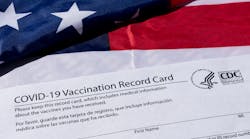An Ohio-based federal appeals court late Friday narrowly quashed a stay put in force by another appeals court, allowing the nationwide COVID-19 vaccine mandate for larger private employers to move forward in a legal battle that heads to the U.S. Supreme Court.
The clock ticks now toward a decision by the nine Supreme Court justices about whether to intervene in the phase-in of the U.S. Occupational Safety and Health Administration (OSHA) rules, or “emergency temporary standard,” which takes effect Jan. 4 and applies to all private employers in the U.S. with 100 or more employees. It requires employees to prove their vaccination status or, if they are unvaccinated, to submit to weekly tests.
See also: Vaccine mandate lawsuits head to 6th U.S. Circuit
The Supreme Court arguments likely will be framed as the need to protect workers and the public against a deadly and mutating virus—and perhaps OSHA’s authority to do so—versus the financial burden businesses must bear to comply with the mandate and the impact on already shrunken labor pools—for trucking that’s chiefly the driver and mechanic shortages and the compliance at fleet headquarters and in maintenance shops and terminals.
Several trucking groups, including American Trucking Associations (ATA) and at least three state trucking associations, were among the assortment of conservative-leaning state attorneys general, trade associations, businesses, and religious and other groups that asked for the OSHA rules to be blocked. A group of 27 such business groups wasted no time late on Dec. 17 in filing their appeal to the Supreme Court.
A three-judge panel of the 6th U.S. Circuit Court of Appeals, which was assigned by lottery to mediate the numerous cases from the several states and courts, was the court that on Dec. 17 lifted a stay put in place by the conservative Louisiana-based 5th Circuit Court of Appeals, which in a blistering 22-page opinion on Nov. 12 opposed the OSHA rules. The pendulum swung back toward OSHA and the Biden administration with the 6th Circuit’s Dec. 17 opinion in favor of the government’s emergency motion to dissolve the 5th Circuit’s pause of the vaccine mandate.
Judges side with public health, OSHA's authority
“Fundamentally, the [emergency temporary standard] is an important step in curtailing the transmission of a deadly virus that has killed over 800,000 people in the United States, brought our healthcare system to its knees, forced businesses to shut down for months on end, and cost hundreds of thousands of workers their jobs,” the Cincinnati-based 6th Circuit said in its opinion Friday.
One of two 6th Circuit Judges, Jane B. Stranch, also wrote: “OSHA explains why the mechanics of COVID-19 transmission make our traditional workplaces ripe for the spread of the disease, putting workers at heightened risk of contracting it.”
In her concurrence, Judge Julia S. Gibbons wrote: “Given OSHA’s clear and exercised authority to regulate viruses, OSHA necessarily has the authority to regulate infectious diseases that are not unique to the workplace.”
Judge Joan L. Larsen dissented, arguing against OSHA’s authority to issue the mandate and on behalf of businesses and trade groups that say the mandate will aggravate staffing shortages. ATA and other state trucking groups and advocates have said the mandate will exacerbate the driver shortage, which they estimate is 80,000 and could grow to 160,000 by the end of the decade.
“The vaccinate-or-test mandate will exacerbate these shortages,” Larsen wrote in her dissent, citing one manufacturing company, Oberg Industries, which says the mandate will cost 30% of its workforce. “The papers before this court are filled with similar stories. There is no question that if these harms occur, they will be irreparable.”
“The business petitioners say they will be harmed in various ways, including unrecoverable compliance costs and loss of employees amidst a labor shortage,” Larsen also notes in her dissent.
Stranch was appointed by President Obama in 2010 while Gibbons was elevated to the 6th Circuit by President George W. Bush in 2002. Larsen, who dissented, was appointed by President Trump in 2017.
ATA: 'We will fight it until it’s defeated'
ATA and its member trucking associations have contended—with agreement from the Labor Department—that truck drivers themselves would be exempt, based on the parts of the OSHA standard that say those who don’t report to workplaces where others are present and those who work exclusively outdoors are excluded. Also exempt from the OSHA rules are employees who work from home. However, those who work at fleet facilities and maintenance shops, for example, would be subject to the regulation.
The mandate is widely a topic of discussion in trucking circles.
“The vaccine mandate is a concern. Over half the nation’s drivers are unvaccinated,” Jana Jarvis, president and CEO of Oregon Trucking Associations (OTA), said during a Dec. 7 media roundtable on the strained supply chain, to which the driver shortage contributes. OTA sponsored the roundtable. Mike Card of Combined Transport, a former ATA chairman, participated in it and criticized the federal vaccine mandate.
ATA's president and CEO, Chris Spear, on Dec. 17 expressed the trade group’s disappointment and blasted the the 6th Circuit’s decision, noting that the court had declined to put its deliberations to the full 16-judge en banc court with jurisdiction over the 6th Circuit, which he said is evenly split on the vaccine mandate.
“We are of course disappointed by the panel’s decision, potentially throwing our industry into chaos at our busiest time of the year–to say nothing of the effects on the other businesses, employees, and consumers more broadly,” Spear said in an ATA release to its members and the media on Dec. 17.
“We will pursue an immediate appeal to the U.S. Supreme Court to reinstate the stay, where we are confident that upon full review the court will soon reject this unlawful mandate. It is evident that OSHA overstepped its statutory authority … so make no mistake: ATA will not stop fighting this misguided policy until our members and industry are fully relieved from its harmful impact on our ability to keep America’s supply chain moving. This mandate threatens to further disrupt our industry and its essential role in the nation’s COVID response efforts, and we will fight it until it’s defeated through any and all means necessary.”
Under the disputed OSHA rulemaking, if individuals choose not to be vaccinated, they must be tested for COVID-19 weekly or within seven days prior to returning to work, with employers not mandated to pay for the testing. Employers must enforce the mandate, ensuring employees are vaccinated or that they supply weekly negative test results.
Employers also must keep records for each employee, including vaccination status and acceptable proof of vaccination. Employers are responsible for providing paid time off (up to four hours) and subsequent sick days after the vaccinations, as the shot may cause common side effects such as fatigue, headaches, muscle pain, chills, fever, and nausea.
This FleetOwner story is still developing.



